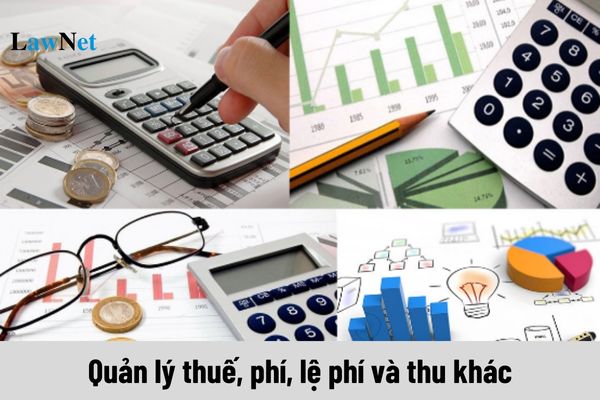What responsibilities does the Ministry of Finance of Vietnam have in the management of taxes, fees, charges, and other revenues for the state budget?
What functions does the Ministry of Finance of Vietnam have?
Pursuant to the provisions of Article 1 Decree 14/2023/ND-CP, the Ministry of Finance of Vietnam is a government agency of the Government of Vietnam that performs the state management functions over:
Finance - Budget (including: state budget; state treasury; public debt; taxes; fees, and charges and other revenues for the state budget; state reserves; state financial funds; financial investment; corporate finance; cooperative finance and collective economy; public assets in accordance with the law); customs; accounting; independent auditing; pricing; securities; insurance; financial services and other services under the state management scope of the ministry; performing ownership representation of state capital at enterprises under the ministry in accordance with legal regulations.

What responsibilities does the Ministry of Finance of Vietnam have in the management of taxes, fees, charges, and other revenues for the state budget? (Image from the Internet)
What responsibilities does the Ministry of Finance of Vietnam have in the management of taxes, fees, charges, and other revenues for the state budget?
Pursuant to Clause 6, Article 2 Decree 14/2023/ND-CP, the duties and powers of the Ministry of Finance of Vietnam in managing taxes, fees, charges, and other revenues for the state budget include:
- Unified management, direction, and inspection of the organization and implementation of the collection of taxes, fees, charges, and other revenues of the state budget according to the conformity of the law for tax authorities, customs, and other agencies assigned by the state to collect fees, charges, or other revenues for the state budget;
- Presiding and cooperating with relevant agencies to develop, submit to competent authorities for issuance, and guide, inspect the implementation of legal documents on taxes, fees, charges, land levy, land and water lease fees, lease and sale of state-owned housing fees, registration fees, and other revenues of the state budget as stipulated by law;
- Deciding within its authority or submitting to the Prime Minister of the Government of Vietnam decisions on tax exemption, tax reduction, tax refund, tax recovery, tax debt write-off, fines, and other revenues of the state budget or abolishing other forms of punishment for violations of the tax law according to the provisions of the law and arising issues during the implementation of bilateral or multilateral international tax treaties;
- Issuing regulations on procedures, professional processes for the collection and payment of taxes, fees, charges, and other revenues of the state budget as stipulated by law; guiding professional practices: tax declaration, tax calculation, tax payment, issuance of tax collection orders, and other related issues;
- Inspecting and controlling sources of state budget revenue, compliance with the legal provisions on the collection and payment of the state budget, and handling violations of legal provisions on taxes, fees, charges, and other revenues of the state budget within its authority as stipulated by law;
- Evaluating the compliance of tax policies, fees, charges, and other state budget revenues with other current mechanisms and policies, and the socio-economic situation in each period to adjust, amend, supplement under its authority, or promptly propose competent authorities to adjust, amend, supplement.
What duties and powers does the Ministry of Finance of Vietnam have in managing national reserves?
Pursuant to Clause 8, Article 2 Decree 14/2023/ND-CP, the duties and powers regarding the management of national reserves are stipulated as follows:
- Presiding and cooperating with ministries and relevant agencies to develop, submit to competent authorities for approval, the list, detailed list of national reserve goods, total national reserve level, and national reserve plan;
- Issuing national technical standards, economic - technical norms, and managing quality for national reserve goods and standards for national reserve warehouses (excluding the national reserve warehouse standards of the Ministry of Public Security and the Ministry of Defense) according to the provisions of the law;
- Issuing regulations on financial management policies, the maximum purchase price, minimum sale price, indemnity price for national reserve goods, the expense levels for the purchase, sale, import, export, preservation, insurance, relief, support, and aid of national reserve goods as stipulated by law;
- Based on the state budget estimates, the approved national reserve plan, ensuring financial resources for the national reserve activities of the ministries and central authorities managing national reserve goods; appraising and consolidating the budget for national reserve expenditures;
- Inspecting and supervising specialized activities regarding national reserves in accordance with legal provisions;
- Organizing the implementation of regulations on management, preservation, import, export, purchase, sale, and rotation of national reserve goods as stipulated by law.

